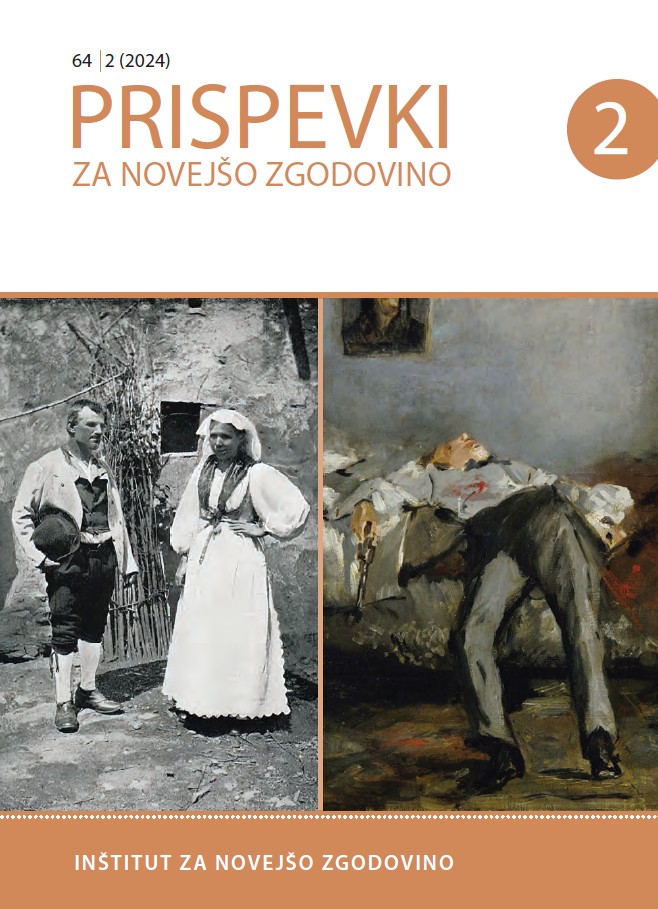Suicide in the Perception of the Slovene Society from the 19th Century up to World War II.
DOI:
https://doi.org/10.51663/pnz.64.2.07Keywords:
suicide, gender, social class, 19th century, the middle class, intellectuals, victimhoodAbstract
The article addresses the question of how suicide was perceived by the Slovene society of the second half of the 19th and the first half of the 20th century. Particular attention is paid to the question of how autobiographical sources addressed the topic of suicide and how it was presented in the context of the emotional regime of the period. In doing so, focus is given to reasons or motives for suicides mentioned in memoirs and letters, to people who committed them and to the mode in which suicides were described by their contemporaries, family members or friends. As demonstrated, suicides were contextualised in very different ways, depending on one’s gender, social class or political affiliation, and motives for taking one’s life included a wide plethora of reasons.
References
Cankar, Izidor. “Gospodin Franjo.” Dom in svet 27, Nos. 3–4 (1914): 126–127.
Göstl, Fran. “Bežkova bolezen in smrt.” Popotnik 41, No. 12 (1920): 263–264.
Govor brata Vladimira Ravnihara. Sokolski glasnik 3, Nos. 5/6 (1921): 184–186.
Gradnik, Alojz. Zbrano delo. Peta knjiga. Ljubljana: Litera, 2008.
Jeraj Hribar, Vida. Večerna sonata. Spomini z Dunaja, Pariza in Ljubljane 1902–1933. Ljubljana, Založba Mladinska knjiga, 1992.
Kmet, Marija. Moja pota. Groblje: Misijonske tiskarne, 1933.
Kopač, Josip. “O preteklih dneh.” Pod lipo 2, No. 2 (1925): 29-30.
Kuttelwascher, Hans. “Selbstmord und Selbstmordstatistik in Österreich.” Statistische Monatsschrift 17 (1912): 267–351.
Lokar, Anica. Od Anice do Ane Antonovne. Ljubljana: Založba Mladinska knjiga, 2002.
Mihurko, Katja, Primož Mlačnik and Ivana Zajc (eds.) Ljubim lepa pisma. Dopisovanje avtoric slovenske moderne. Nova Gorica: Založba Univerza v Novi Gorici, 2024.
Mikuš, A. “Nekaj spominov na prijatelja Bežka.” Popotnik 41, No. 12 (1920): 210–212.
Moravec, Dušan. Pisma Frana Govekarja. Druga knjiga. Ljubljana: Slovenska akademija znanosti in umetnosti, 1982.
Mrvoš. “Dr. Ivan Oražen.” Sokolski glasnik 3, Nos. 5/6 (1921): 162–166.
Nučič, Hinko. Igralčeva kronika. Ljubljana: Knjižnica mestnega gledališča, 1960.
P.H. “Zofka Kveder-Demetrovićeva.” Ženski svet 4, (1926): 400–401.
Trdina, Janez. Zbrana dela. Tretja knjiga. Ljubljana: DZS, 1951.
Ušeničnik, Aleš. “Samomor.” Čas 2, No. 6 (1908): 295–297.
Veble, Andrej. “Dijaštvo in socialno delo.” Čas 4, Nos. 1–2 (1910): 68–78.
Vošnjak, Josip. Spomini. Ljubljana: Slovenska matica, 1982.
Žorga, Marcel. Most. Ljubljana: Slovenske železnice, 2015.
Periodicals
“Samomori med omladino.” Slovenski narod, 13 February 1926.
“Tomšičev pogreb,” Slovenski narod, 1 June 1861.
“Zagovor samomora in umora iz ljubezni do bližnjega,” Slovenski narod, 8 October 1904.
IC, “Ivan Štefe.” Slovenec, 8 February 1919.
Miran Hladnik, “Z romanom po strankarskem nasprotniku. ” Retrieved 1 February 2024, https://slov.si/mh/malovrh2.html.
Oražnov dijaški dom. Zvonka Zupanič Slavec, “Dr. Ivan Oražen. ” Retrieved 31 January 2024, https://www.orazen.net/dr-ivan-orazen/.
Slovenska biografija. “Ivan Štefe.” Retrieved 8 July 2023. Štefe, Ivan (1875–1919) – Slovenska biografija (slovenska-biografija.si).
Downloads
Published
Issue
Section
License
Copyright (c) 2024 Irena Selišnik

This work is licensed under a Creative Commons Attribution 4.0 International License.
Authors who publish with this journal agree to the following terms:
- Authors retain copyright and grant the journal right of first publication with the work simultaneously licensed under a Creative Commons Attribution License that allows others to share the work with an acknowledgement of the work's authorship and initial publication in this journal.
- Authors are able to enter into separate, additional contractual arrangements for the non-exclusive distribution of the journal's published version of the work (e.g., post it to an institutional repository or publish it in a book), with an acknowledgement of its initial publication in this journal.
- Authors are permitted and encouraged to post their work online (e.g., in institutional repositories or on their website) prior to and during the submission process, as it can lead to productive exchanges, as well as earlier and greater citation of published work (See The Effect of Open Access).
Funding data
-
Javna Agencija za Raziskovalno Dejavnost RS
Grant numbers J6-3123


